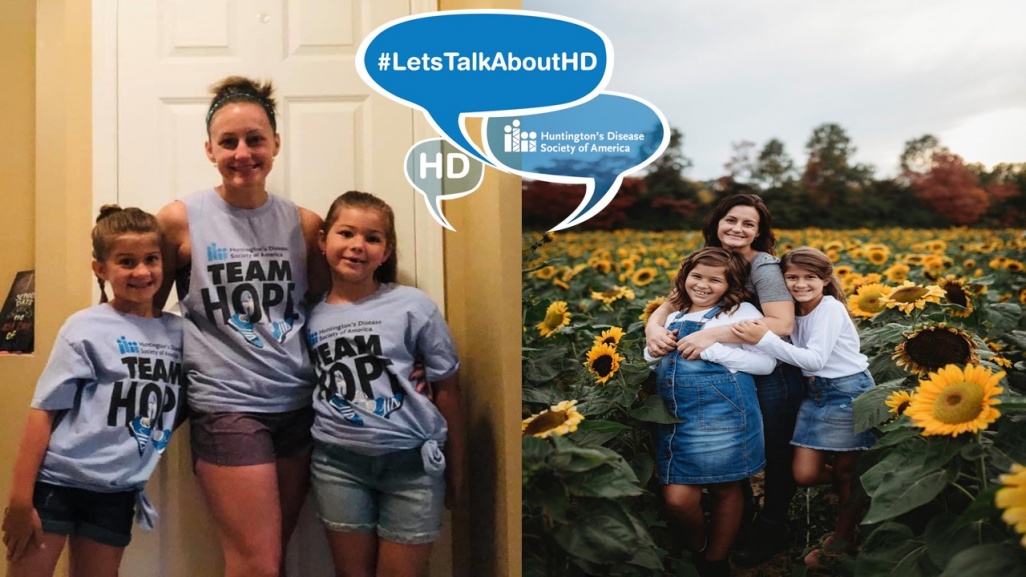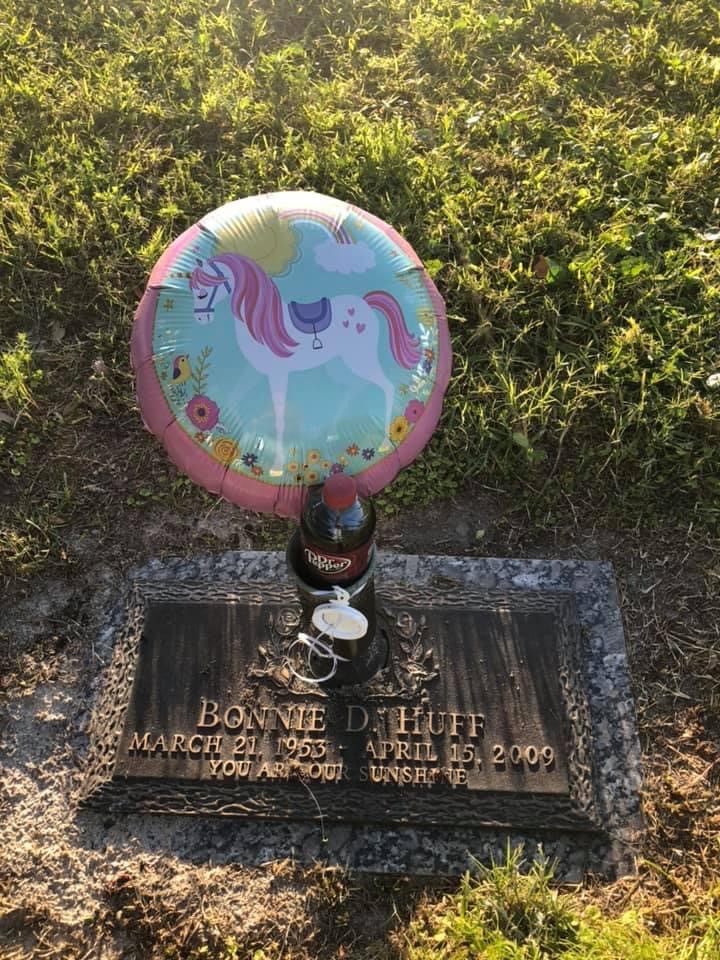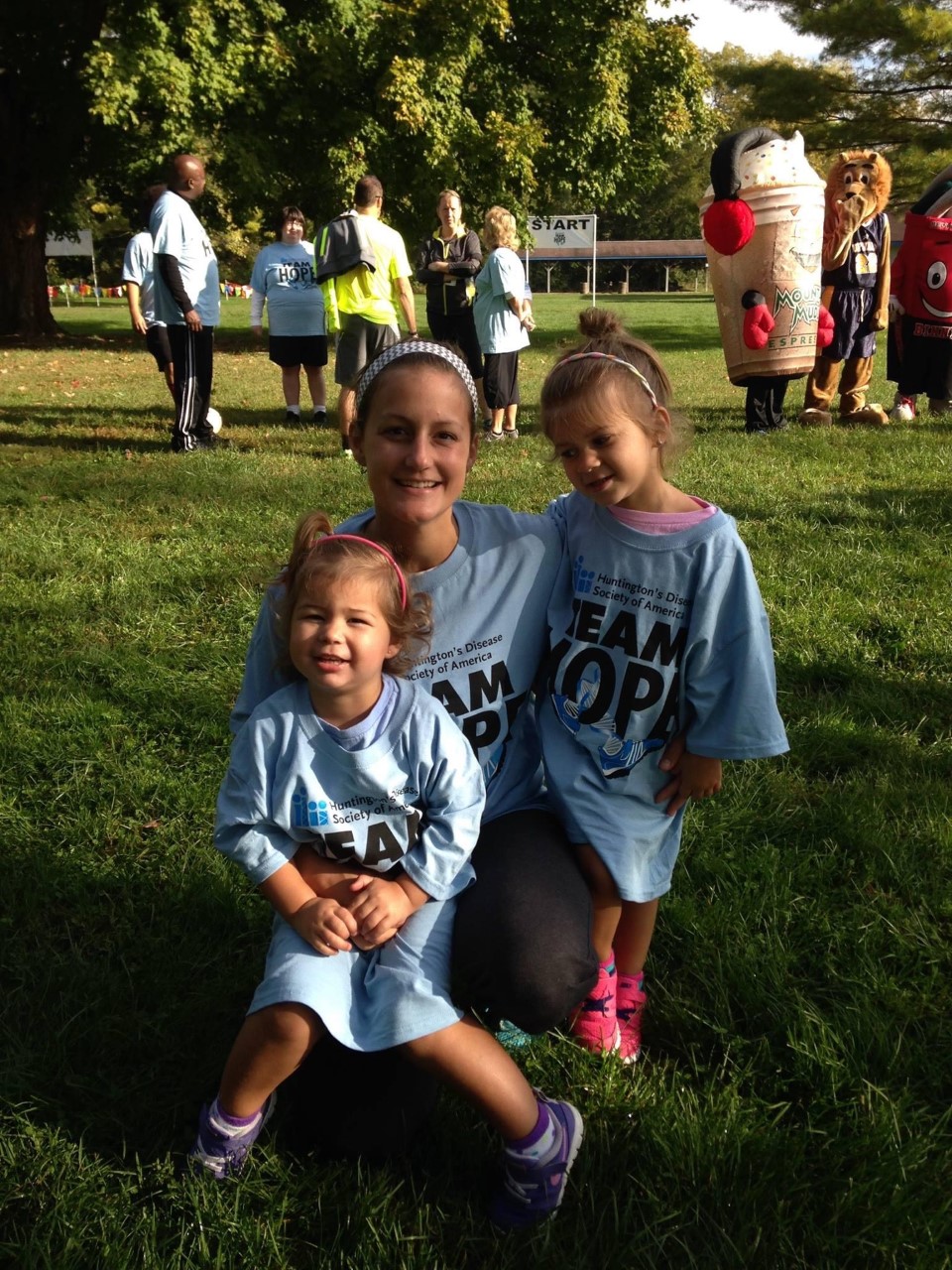
By Matthew Santamaria (msantamaria@hdsa.org)
Cincinnati resident Amber Boland grew up with two older siblings (brother and sister). Throughout her life, Amber’s mom was always there for the eldest siblings for the important parts of their life. However, it was different for Amber.
By the time she was about 14-years-old, her mother was diagnosed with the gene that causes Huntington’s disease (HD), fatal genetic disorder that causes the progressive breakdown of nerve cells in the brain. It deteriorates a person’s physical and mental abilities during their prime working years and has no cure.
“It is a blur thinking back on it, but I do know I was young and naïve,” said Amber. “A lot of people think the baby of the family gets everything they want, but when you have a sick parent, the baby of the family gets the short end of the stick sometimes.”
Once Amber graduated high school, her mother was placed in the hospital not due to the physical symptoms of HD but the mental ones. The symptoms of HD are described as having ALS, Parkinson’s and Alzheimer’s – simultaneously. Symptoms include personality changes, mood swings, depression, forgetfulness, impaired judgement, unsteady gait, involuntary movements, slurred speech, difficulty in swallowing, and significant weight loss.
“I still don’t think I was mature enough to deal with the idea of having a sick parent at that time, or I had just shut down that emotional side in my head,” Amber explains.
As Amber would continue to visit her mother, she noticed that the different parts of her mother were gone day by day.
“I remember getting a call that she was going to be put in hospice and while most people would be sad, I was happy,” said Amber. “I was happy she wasn’t going to be suffering anymore. My sister and I rushed down to Florida from Ohio to see her, for what we thought was going to be the last time. She survived several more visits before she finally lost her battle.”

Five months away from her wedding, 25-year-old Amber buried her mother relieved that she was no longer suffering. However, before she got engaged, Amber decided to get tested for HD.
The decision to get genetically tested is difficult to make. Each year, 5-10% are tested. It is never the right or wrong decision to be tested. There are people that see no benefit in knowing that they will develop the disease while others want to know in order to make informed choices about their future. It can take up to several weeks to receive your results from the genetic testing center.
“Getting tested is such a hard, personal decision and I wanted my future husband to know what he was in for,” Amber explains. “I wanted him to know if he was going to have to take care of me, I wanted him to know if I was going to be willing to have kids. There was one thing I knew for sure and that was that if I carried the gene, there was absolutely no way I was going to have kids grow up and watch me die a slow death like I witnessed with my mom.”
Amber tested negative for HD and was not the only family member to be tested.
“My brother has not been tested and has no desire to,” said Amber. “My sister got tested about four years ago and was unfortunately positive. It was very easy for me to see she had it so her diagnosis was not a shock to me. She has three children, so they are all now at risk too. It is a vicious cycle that you will never get out of once you are in it.”
Amber is now a Certified Pharmacy Technician at Cincinnati Children’s Hospital. She has two children that she is raising to understand what HD is and the importance of getting involved in your community.

###
Huntington’s disease (HD) is a fatal genetic disorder that causes the progressive breakdown of nerve cells in the brain. It deteriorates a person’s physical and mental abilities during their prime working years and has no cure. Every child of a parent with HD has a 50/50 chance of inheriting the faulty gene. Today, there are approximately 41,000 symptomatic Americans and more than 200,000 at-risk of inheriting the disease. The symptoms of HD are described as having ALS, Parkinson’s and Alzheimer’s – simultaneously.
The Huntington’s Disease Society of America is the premier nonprofit organization dedicated to improving the lives of everyone affected by HD. From community services and education to advocacy and research, HDSA is the world’s leader in providing help for today and hope for tomorrow for people with HD and their families.
HDSA was founded in 1967 by Marjorie Guthrie, the wife of legendary folk singer Woody Guthrie. Woody died from HD complications when he was only 55 years old, but the Guthrie family legacy lives on at HDSA to this day.
To learn more about Huntington’s disease and the work of the Huntington’s Disease Society of America, visit www.HDSA.org or call 1(800)345-HDSA.
This is a story featuring a personal experience with Huntington’s disease. If you would like to have your story told please contact Matthew Santamaria at msantamaria@hdsa.org
Cincinnati resident Amber Boland grew up with two older siblings (brother and sister). Throughout her life, Amber’s mom was always there for the eldest siblings for the important parts of their life. However, it was different for Amber.
By the time she was about 14-years-old, her mother was diagnosed with the gene that causes Huntington’s disease (HD), fatal genetic disorder that causes the progressive breakdown of nerve cells in the brain. It deteriorates a person’s physical and mental abilities during their prime working years and has no cure.
“It is a blur thinking back on it, but I do know I was young and naïve,” said Amber. “A lot of people think the baby of the family gets everything they want, but when you have a sick parent, the baby of the family gets the short end of the stick sometimes.”
Once Amber graduated high school, her mother was placed in the hospital not due to the physical symptoms of HD but the mental ones. The symptoms of HD are described as having ALS, Parkinson’s and Alzheimer’s – simultaneously. Symptoms include personality changes, mood swings, depression, forgetfulness, impaired judgement, unsteady gait, involuntary movements, slurred speech, difficulty in swallowing, and significant weight loss.
“I still don’t think I was mature enough to deal with the idea of having a sick parent at that time, or I had just shut down that emotional side in my head,” Amber explains.
As Amber would continue to visit her mother, she noticed that the different parts of her mother were gone day by day.
“I remember getting a call that she was going to be put in hospice and while most people would be sad, I was happy,” said Amber. “I was happy she wasn’t going to be suffering anymore. My sister and I rushed down to Florida from Ohio to see her, for what we thought was going to be the last time. She survived several more visits before she finally lost her battle.”

Five months away from her wedding, 25-year-old Amber buried her mother relieved that she was no longer suffering. However, before she got engaged, Amber decided to get tested for HD.
The decision to get genetically tested is difficult to make. Each year, 5-10% are tested. It is never the right or wrong decision to be tested. There are people that see no benefit in knowing that they will develop the disease while others want to know in order to make informed choices about their future. It can take up to several weeks to receive your results from the genetic testing center.
“Getting tested is such a hard, personal decision and I wanted my future husband to know what he was in for,” Amber explains. “I wanted him to know if he was going to have to take care of me, I wanted him to know if I was going to be willing to have kids. There was one thing I knew for sure and that was that if I carried the gene, there was absolutely no way I was going to have kids grow up and watch me die a slow death like I witnessed with my mom.”
Amber tested negative for HD and was not the only family member to be tested.
“My brother has not been tested and has no desire to,” said Amber. “My sister got tested about four years ago and was unfortunately positive. It was very easy for me to see she had it so her diagnosis was not a shock to me. She has three children, so they are all now at risk too. It is a vicious cycle that you will never get out of once you are in it.”
Amber is now a Certified Pharmacy Technician at Cincinnati Children’s Hospital. She has two children that she is raising to understand what HD is and the importance of getting involved in your community.

Amber has a message for the HD Community:
“One thing I have learned dealing with this disease for over twenty years now is life is short. Be happy. Find happiness. Don’t spend your days in a job you hate, in a relationship that doesn’t make you happy, with people who bring you down. You don’t get to decide every aspect of your life, but you do decide if your days are going to be filled with happiness and hope or sadness and doubt. Choose happy.”
“One thing I have learned dealing with this disease for over twenty years now is life is short. Be happy. Find happiness. Don’t spend your days in a job you hate, in a relationship that doesn’t make you happy, with people who bring you down. You don’t get to decide every aspect of your life, but you do decide if your days are going to be filled with happiness and hope or sadness and doubt. Choose happy.”
###
Huntington’s disease (HD) is a fatal genetic disorder that causes the progressive breakdown of nerve cells in the brain. It deteriorates a person’s physical and mental abilities during their prime working years and has no cure. Every child of a parent with HD has a 50/50 chance of inheriting the faulty gene. Today, there are approximately 41,000 symptomatic Americans and more than 200,000 at-risk of inheriting the disease. The symptoms of HD are described as having ALS, Parkinson’s and Alzheimer’s – simultaneously.
The Huntington’s Disease Society of America is the premier nonprofit organization dedicated to improving the lives of everyone affected by HD. From community services and education to advocacy and research, HDSA is the world’s leader in providing help for today and hope for tomorrow for people with HD and their families.
HDSA was founded in 1967 by Marjorie Guthrie, the wife of legendary folk singer Woody Guthrie. Woody died from HD complications when he was only 55 years old, but the Guthrie family legacy lives on at HDSA to this day.
To learn more about Huntington’s disease and the work of the Huntington’s Disease Society of America, visit www.HDSA.org or call 1(800)345-HDSA.
This is a story featuring a personal experience with Huntington’s disease. If you would like to have your story told please contact Matthew Santamaria at msantamaria@hdsa.org
